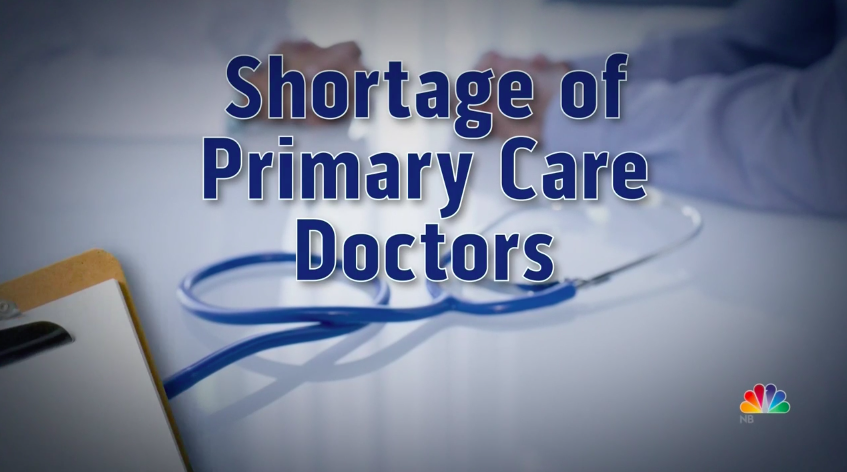Direct Primary Care on NBC News
This week, Direct Primary Care was featured on NBC Nightly News with Lester Holt. If you are unfamiliar with this new model for healthcare delivery, Direct Primary Care is a membership model for healthcare that charges a relatively low fee for primary care services. The NBC News team starts out the piece by discussing the amount of time that the doctor is able to spend with the family, "maybe 30 - 45 minutes". At Plum Health, our visit time is about 1 hour for initial visits and 30 minutes for follow ups, so on par with what was stated in the video.
The video then goes on to discuss the benefits of Direct Primary Care with unlimited visits and the ability to text message the doctor for a flat, monthly fee. For most direct primary care doctors, patients are able to visit the doctor and have digital interactions with the doctor whenever necessary. At Plum Health, our patients can call, text, and email anytime and see us in the office anytime they need us.
The article then discusses the cost of the monthly membership, which is typically between $25 and $85 per month. In our case at Plum Health DPC, our prices are between $10/month for children up to $89/month for adults over 65 years of age. Young adults under 40 years old pay $49/month and adults over 40 years old pay $69/month. Direct Primary Care practices across the country typically fall in the $10 - $100/month range. Any monthly charges over and above $100 gets into the realm of Concierge Medicine. We wrote a previous blog post about the difference between Direct Primary Care and Concierge Medicine, here.
The NBC Nightly News piece goes on to discuss what's included in or what is covered by a typical Direct Primary Care practice. Typically, DPC practices cover unlimited primary care visits. At Plum Health DPC, our patients have unlimited visits with Dr. Paul, unlimited texting, emails and phone calls or unlimited digital communication. In addition, we charge at-cost pricing for routine lab tests and we charge wholesale prices for medications. Some doctors choose to include some basic blood work in the cost of the membership.
Because we don't charge an enrollment fee, we chose not to include basic blood work in our service. Instead, we perform at-cost labs at Plum Health. Complete blood cell counts are $4, Comprehensive metabolic panels are $6, Thyroid Stimulating Hormone tests are $6, Lipid panels are $6.55, and we have a modest draw fee of $2.
Families save money by choosing Direct Primary Care. The NBC News article discusses how the family featured in the video saves $500 each month by using a Direct Primary Care service and pairing that with a low premium, high-deductible plan.
This pairing of services is the ideal way to save money on your health care expenses. The issue that some people run in to is finding that Catastrophic coverage plan. Many of those plans have gone away after the Affordable Care Act was signed into law by President Obama. This is one of the many road blocks to wider implementation of Direct Primary Care plans. The other impediments include the inability to use Health Savings Account funds for DPC plans.
The next part of the article gets into the philosophy of Direct Primary Care. It talks about how Dr. Cunningham left a traditional family medicine practice. Now that he operates a Direct Primary Care practice, he sees fewer patients and makes less money. But, the income loss is worth it to him, so long as the insurance companies no longer dictate how he's supposed to take care of patients.
This part of the video touched a nerve with me. So often, we as doctors do not take care of our patients in the most optimal or ideal way because of the barriers put in front of us by insurance companies. By not accepting insurance company dollars, we are free to take care of patients in the way that they deserve to be taken care of. Dr. Cunningham says "It feels great to be practicing medicine the way it's supposed to be", and I agree!
Operating Plum Health DPC has allowed me to develop deep, trusting relationships with my patients that I never got to experience as a resident or in a traditional practice. The element that is so important to developing this relationship is time. When I am able to spend an hour with each patient during each visit, I am able to give them my full attention and deliver the kind of care that they deserve.
Dr. Cunningham, a Direct Primary Care doctor in Massachusetts, talks about how he is able to practice medicine the way he's supposed to be.
On the other hand, the article highlights the critical elements of Direct Primary Care: "Critics say there's already a shortage of primary care doctors". They don't really expound upon this thought or bring this thought to its logical conclusion, which is that if we already have a shortage of primary care doctors, then it is inexcusable for those primary care doctors to see less patients.
I take umbrage with this remark. There is a dearth of excellent primary care doctors because the practice of primary care medicine is one of the most challenging fields in medicine and it is often the lowest paid field in medicine. Medical students often choose higher-paying specialties in medicine that come with greater job satisfaction and less role strain.
I see the practice of Direct Primary Care as solving some of the issues with the current system. DPC medicine helps to eliminate the role strain that young doctors feel. When I have an hour to take care of a patient, I can really address them as a whole person. In the traditional or fee-for-service model, a primary care doctor has 10 - 15 minutes to address the whole patient, and this is nearly impossible. I've been there, seeing patients at this rate, and the best you can do is address 1 or 2 concerns before you have to move on to the next patient.
Direct Primary Care also can offer doctors a chance to earn a greater income if they have a panel of roughly 500 patients or members in their DPC practices. Some doctors choose to see less patients in their DPC practices, and therefore would make less money, but there is an opportunity to increase primary care doctors' salaries.
By eliminating the role strain that primary care doctors experience and by paying them a better salary, we can attract more medical students to primary care medicine fields like family medicine, general internal medicine, and general pediatrics. I take umbrage with the thrust that doctors should not see less patients because the system is broken.
It would be worse to see the system perpetuated with exhausted, frustrated, burnt-out primary care doctors seeing 2,500 patients each year. It would be better to have more medical students attracted to primary care fields, seeing 500 patients each year, limiting their role strain and increasing their incomes.
Another critique is that Direct Primary Care does not cover specialists visits or hospitalizations. I find this to be a moot point because the main thrust of Direct Primary Care is to deliver primary care services directly to our patients. We make no mention of Direct Specialty Care or Direct Hospital Care, and we make no attempt to promote these services in our offerings.
Too often, American consumers conflate "health care" with "health insurance", but these are distinct and separate services. You need to have health insurance, either a low-premium, high-deductible plan or a catastrophic coverage plan. This health insurance does exactly what the name implies: it insures you and your health against major, unexpected events.
Direct Primary Care, then, delivers the affordable, every-day primary care services that are needed by you and your family. You need to have primary care coverage, but you shouldn't have to pay an insurance company to pay your primary care doctor for what amounts to low-cost primary care services.
It makes sense to pay an insurance company to pay hospitals and surgeons for higher cost care, but it doesn't make sense to pay insurance companies to pay your primary care doctor for relatively lower cost primary care services.
As a side note, Plum Health DPC does offer specialists consultations for difficult clinical questions through our relationship with Rubicon MD. This allows us to ask about diagnostic testing, special labs to order, or to help us solve a difficult problem. But, as in the video, we do not offer specialists visits as a part of our service.
The closing thought from the NBC Nightly News video is that despite the drawbacks, it is worth it for some individuals and families to pay for Direct Primary Care services. As a Direct Primary Care doctor, the benefits are clear: you have a doctor on call for you any time you need it and access to time and cost-saving auxiliary services. The NBC reporter says that "Direct Primary Care is the answer, to save money and have a doctor who's always 'in'".
Thanks for reading and have a wonderful day,
- Dr. Paul with Plum Health DPC










